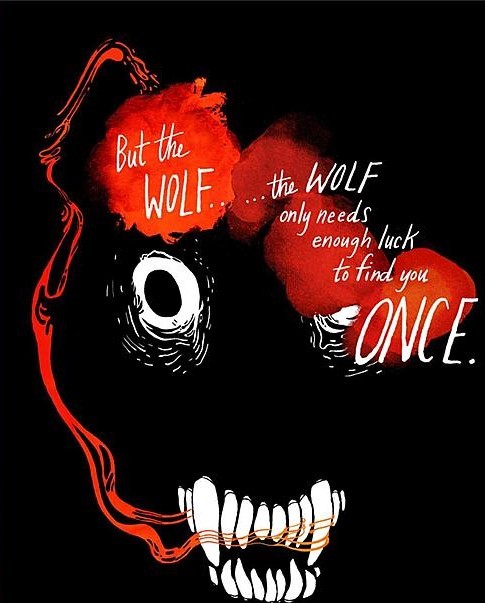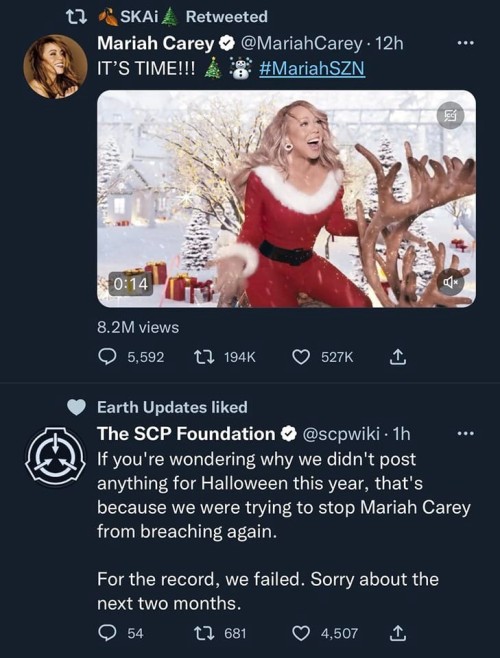
Where once there was theme,Now sometimes there’s meme
106 posts
Halloween Is The Perfect Time To Read The Incredible Works Of Emily Carroll, My Absolute Favorite Horror
Halloween is the perfect time to read the incredible works of Emily Carroll, my absolute favorite horror cartoonist and storyteller. You can read many of her works free on her website!
I especially love His Face All Red, The Groom, The Hole the Fox Did Make, and Out of Skin.




I cannot over-recommend Carroll’s short story collection Through the Woods, which is one of the best works of fiction (horror or otherwise) I’ve ever read. If you can, get a copy from your local library or bookstore!


Got to go, it’s Halloween and I’m spending my evening sitting in the dark, drinking hot chocolate, re-reading these spooky comics while the wind rattles at the windows.
-
 jonhjosh reblogged this · 11 months ago
jonhjosh reblogged this · 11 months ago -
 speedybasementalpaca reblogged this · 1 year ago
speedybasementalpaca reblogged this · 1 year ago -
 speedybasementalpaca liked this · 1 year ago
speedybasementalpaca liked this · 1 year ago -
 nervousnumbat reblogged this · 1 year ago
nervousnumbat reblogged this · 1 year ago -
 portaproslowbro liked this · 1 year ago
portaproslowbro liked this · 1 year ago -
 issu reblogged this · 1 year ago
issu reblogged this · 1 year ago -
 pile-of-cats reblogged this · 1 year ago
pile-of-cats reblogged this · 1 year ago -
 folklore-fantasy-and-sci-fi liked this · 1 year ago
folklore-fantasy-and-sci-fi liked this · 1 year ago -
 ganymedesclock liked this · 1 year ago
ganymedesclock liked this · 1 year ago -
 gaelicfalcon reblogged this · 1 year ago
gaelicfalcon reblogged this · 1 year ago -
 tacoconut liked this · 1 year ago
tacoconut liked this · 1 year ago -
 holladiewaldfeeeeeeeeeeeeeeee liked this · 1 year ago
holladiewaldfeeeeeeeeeeeeeeee liked this · 1 year ago -
 holladiewaldfeeeeeeeeeeeeeeee reblogged this · 1 year ago
holladiewaldfeeeeeeeeeeeeeeee reblogged this · 1 year ago -
 axsolotle liked this · 1 year ago
axsolotle liked this · 1 year ago -
 nervousflowerwombat reblogged this · 1 year ago
nervousflowerwombat reblogged this · 1 year ago -
 nervousflowerwombat liked this · 1 year ago
nervousflowerwombat liked this · 1 year ago -
 twelveratsinatrenchcoat2 liked this · 1 year ago
twelveratsinatrenchcoat2 liked this · 1 year ago -
 liminal-criminals reblogged this · 1 year ago
liminal-criminals reblogged this · 1 year ago -
 sunstonedragons reblogged this · 1 year ago
sunstonedragons reblogged this · 1 year ago -
 ceoofdumbassery liked this · 1 year ago
ceoofdumbassery liked this · 1 year ago -
 that1smilingcat liked this · 1 year ago
that1smilingcat liked this · 1 year ago -
 irondadz liked this · 1 year ago
irondadz liked this · 1 year ago -
 the-anti-clutter-space reblogged this · 1 year ago
the-anti-clutter-space reblogged this · 1 year ago -
 cassidyisnowdrawing liked this · 1 year ago
cassidyisnowdrawing liked this · 1 year ago -
 kiwi245 reblogged this · 1 year ago
kiwi245 reblogged this · 1 year ago -
 sadratticus liked this · 1 year ago
sadratticus liked this · 1 year ago -
 fortunatelykawaiitiger reblogged this · 1 year ago
fortunatelykawaiitiger reblogged this · 1 year ago -
 kulolochin reblogged this · 1 year ago
kulolochin reblogged this · 1 year ago -
 aiza-luna liked this · 1 year ago
aiza-luna liked this · 1 year ago -
 kitkaedatidler liked this · 1 year ago
kitkaedatidler liked this · 1 year ago -
 puppetmaster13u liked this · 1 year ago
puppetmaster13u liked this · 1 year ago -
 a-pansexual-with-pancakes liked this · 1 year ago
a-pansexual-with-pancakes liked this · 1 year ago -
 hamboningu2 liked this · 1 year ago
hamboningu2 liked this · 1 year ago -
 pidgethehuman reblogged this · 1 year ago
pidgethehuman reblogged this · 1 year ago -
 happinessisntfun reblogged this · 1 year ago
happinessisntfun reblogged this · 1 year ago -
 ohgodoliver reblogged this · 1 year ago
ohgodoliver reblogged this · 1 year ago -
 laplumeplusfortequelepee liked this · 1 year ago
laplumeplusfortequelepee liked this · 1 year ago -
 k-kago liked this · 1 year ago
k-kago liked this · 1 year ago -
 basement-hobo liked this · 1 year ago
basement-hobo liked this · 1 year ago -
 a-cosmonaut-or-an-astronaut reblogged this · 1 year ago
a-cosmonaut-or-an-astronaut reblogged this · 1 year ago -
 sentakatsukiofficial liked this · 1 year ago
sentakatsukiofficial liked this · 1 year ago -
 exalok reblogged this · 1 year ago
exalok reblogged this · 1 year ago -
 spared-on-technicality liked this · 1 year ago
spared-on-technicality liked this · 1 year ago -
 imnotadogiswear liked this · 1 year ago
imnotadogiswear liked this · 1 year ago -
 purplerosewrites reblogged this · 1 year ago
purplerosewrites reblogged this · 1 year ago -
 originalcharacterdesign reblogged this · 1 year ago
originalcharacterdesign reblogged this · 1 year ago -
 kleighray liked this · 1 year ago
kleighray liked this · 1 year ago
More Posts from Justanotherwizard

To help everyone understand the gravity of the situation with Unity's recent bullshit, here are some games made in unity:
Cult of the Lamb
Bendy and the Ink Machine
Untitled Goose Game
Road 96
Cuphead
Power Wash Simulator
Genshin Impact
Getting Over It
Inside
Tem Tem
Kerbal Space Program 1
Kerbal Space Program 2
Rust
Rimworld
Outer Wilds
Dream Daddy
Thomas Was Alone
I Am Setsuna
Tunic
Night in the Woods
Pony Island
Return of the Obra Dinn
Among Us
Pokemon Go
Hollow Knight
Ori and the Blind Forest
Ori and the Willow of the Wisps
Vampire Survivors
Two Point Hospital
City Skylines
The Long Dark
Firewatch
Oxenfree
Subnautica
Subnautica: Below Zero
Fall Guys
Many, MANY MORE
Unless you only play tRIpLE A titles this will most likely affect a game you like. Hell, it can even affect really big games like Pokemon Go.
For a long time, starting years and years back, a lot of people have been talking about the preservation of games and being against moving to digital only games for reasons like this, and how the greed of various big companies in the game industry will negatively impact access to games and their preservation. It's happening. This will impact games that are already out. This will impact games being made. This will impact games made in the future. So if you care even a teensy tiny bit about a single game made in unity, or you care about the future of game development period, I suggest you pay very close attention.
A good article from an indie developer detailing the changes and exactly how it screws devs over:
















Worth Existing (or, Frank Webster Gives Keegan An Existential Crisis)
been busy this semester, but have a reflection comic I got away with making for an information history class! it's rambling, but i had some fun digesting my thoughts.
image descriptions from alt: The title page contains the title “Worth Existing, or: Frank Webster gives Keegan an existential crisis.” In front of a mirror, Keegan stands with their back facing the viewer as a reflection of them as a librarian looks back worriedly.
Page 1 features a sequential cartoonish sequence of Keegan’s head rolling and landing on his shoulders. He says: “Finding out how we’ve come to view our information society has been a ride. My pea brain can only fit so much, ideas only roll vaguely when I try to talk about what I’ve learned, but I’m at least seeing things from new eyes. More specifically…”
Dialogue continues on Page 2, 3 panels sequentially zoom in on a horrified Keegan. She says, “I’m seeing how much Frank Webster hates libraries.” The quote from the book she’s reading is as follows: “Moreover, library staff have benefited disproportionately from the establishment of these services, being provided with secure and pleasant (if not lavishly remunerated) employment. Why, one might ask, does the public purse need to support the likes of Agatha Christie and Jeremy Clarkson when their books are readily available for cheap purchase and their literary merit, still more their intellectual and uplifting qualities, are at best of minor significance. Such observations raise questions regarding the efficacy with which public libraries actually operate. It follows that a driving force behind their establishment and continued state support, the appeal to mitigate the inequalities of capitalism in the informational domain, seems to have been less than fully effective.” End quote.
Page 3 has Keegan looking with hands clasped, paused. They then look at the camera, asking “Did the dude just insult Agatha Christie?” The bottom has them lying on their bed, looking up at the ceiling in thought, saying “There’s something that just bugged me ever since I read that chapter. I never really understood the theory we talked about in class, it’s a skill I’m working on, but the weird beef he has with libraries at least gave me a vibe on ‘Hayekian Neoliberalism.’ And also how weird it is that capitalism got so far into deciding what’s worth existing. If the thing I wanna do with my life is worth existing.”
On Page 4, Keegan walks with his crutches as the dialogue continues. “I could go on for hours about all that sucks with Webster’s opinions! Of course I want the staff to ‘disproportionately’ benefit from their work. Unlike books, people have to eat! What’s ironic about Webster’s whole spiel about the efficacy of libraries is that he provides several examples of figures from his area heavily aided by libraries. Panels feature novelist John Banville, author Jeannette Winterson, and sociologist Richard Hoggart. Keegan continues and says, “And yet he goes on to be like…”
Page 5, a sock puppet speaks angrily: “People are getting free books and are hurting the poor bookseller! Libraries are stupid because it doesn’t miraculously fix the inequalities of capitalism!” To the side, the text says “Artist’s exaggeration. Don’t take this seriously.” Bottom panel contains Keegan pointing with her thumb at Frank Webster’s Wikipedia page. She says, “I wouldn’t be so hung up if this was some random guy, but considering this guy is so largely quoted and touted in my field of information sciences? Ouch obviously doesn’t cut how much all that stung.”
Page 6 contains an Asian man with a bun protesting banned books. The next panel contains a white woman with a turtleneck reading in a library as a winter storm brews outside. Keegan off-screen says, “While Webster calls libraries ‘censors of society,’ librarians are fighting vehemently against book bannings! And the way he says that public libraries are ‘captured by the better-off section of society?’ Like what, you’re going to ignore how libraries act as comfortable spaces for folks without housing during harsher months?”
On Page 7 a gavel bangs on a panel. “As if that’s not enough, publishers are suing libraries for distributing e-books, calling them ‘direct economic competitors’ when, if anything, they often support these publishers and their authors by buying multiple copies, hosting events and collaborating with local businesses.” As an example, the comic features a scene of a Black woman in a cardigan talking to a white cashier with a shaved head. She says to them, “I just read this at my library earlier and just needed to get my own copy! Can’t believe it took me this long to discover this author!” A panel below, a pair of hands scoops sand and watches it flow from their fingers. Keegan says, “I don’t know. Even in good company, it sometimes feels like the future is slipping through my fingers.”
Page 8 is a pillar of falling sand. Embedded in it is an Apple pencil, a floating feather, and a book. Keegan narrates, “As an artist and a writer, it’s wondering if I’ll be prioritized over a generative AI that doesn’t have to eat or sleep. As a birder, it’s wondering if the backyard visitors I always see at my feeder will end up as myths and taxidermied specimens. As a librarian, it’s wondering if the institutions I often called home will be felled by the swift axe that the invisible hand holds. It’s a weird feeling of perpetual free fall for a drop that is light years away.”
Page 9, Keegan is holding a book to the sky as they read it. They narrate “Learning is a language I’ve always used to make sense of the thoughts I’ve had swirling in my brain. Finding out ‘information capitalism’ was a thing was like learning about the leash that has pulled at my throat since I entered the schooling system. I am learning because I am not a person, but a tool to be put to a trade. The world around me whispers in my ear…”
“Feel wonder if you must, but don’t linger long enough to turn in something too late.” On page 10, Keegan lies on a grassy field looking up with the book on his chest. He narrates, “I can’t deny that’s a message hard to unhear. As of now, I don’t think I remember much before 2022 other than the grades I got.”
On page 11, a hand wipes a bathroom wall with a sponge. The bottom of the page is filled with floating bubbles. Keegan narrates, “This sounds silly, but I was in tears when I heard about the concept of degrowth this past week. It could’ve been the clorox I was using to clean my bathroom, but the toil of my body and mind must’ve come to some crashing conclusion when I listened past what we were assigned.” The quote goes, They’re essentially making the argument that if we stay on this growth path, the only end to that is, you know, our own extinction. They are not just saying it’s not possible. They’re also saying it’s not desirable. It’s the kind of life that you and I ultimately do not want. We don’t want to drown in just stuff. We want to have a life. We want to have time for each other. We want to have time for creative thinking and art and love and kindness.” The quote ends. It comes from Vox’s Blame Capitalism: Degrowing Pains and is spoken by Dirk Phillipsen.
On page 12, Keegan sits in the bathtub with a few tears. Narration goes, “It was just nice that someone smarter than me in this topic wants the same things I do. Time to live and space to breathe. I know it’s not a perfect solution, but it’s one of those moments that culminate to tears when you’re having a rough week. This time, it was the reminder that this doesn’t have to be all there is to it. That there were people echoing my heartfelt belief that the system that tears down those I love doesn’t have to stay.
Page 13. A frog and toad book. “One-sided beef with Frank Webster aside, this unit has bolstered my love for librarianship. As hastily made and rambling this comic went, I realize I feel this strongly because I love this field so much. Against all odds, even as the internet grew to commodify knowledge, libraries adapted to the best of their abilities for their patrons. Why should some British dude make me wonder if libraries will continue to exist? As depressing as learning about capitalism gets, it’s helpful to understand the hand that takes from you. To understand why and how I’ve always been hurt by the systems that be and make sure I can lighten the blow for those who come after. I’ve learned there’s a lot that can come out of being so sad and scared about the future. Sometimes drawing it out (even if you turn in a late assignment) reminds you that there’s still so much ahead. That, and the fact I should probably read Frog and Toad sometime. So, uh, I’m gonna do that now. Bye!"
The references page lists several sources: Frank Webster’s “Theories of the Information Society.” An article by Brewster Kahle called, “The US library system, once the best in the world, faces death by a thousand cuts.” An article by Rachel Kramer Bussel called, “How Libraries Help Authors Boost Book Sales.” And a podcast episode from Vox’s Today Explained hosted by Noel King, titled “Blame Capitalism: Degrowing Pains.” end descriptions.

